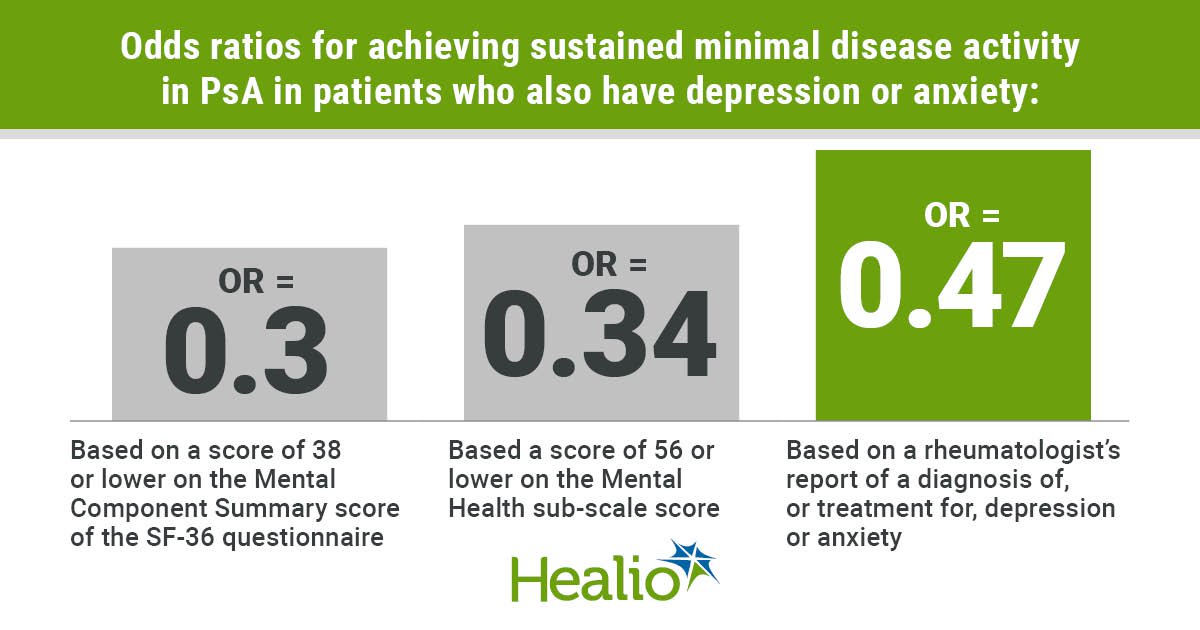March 23, 2021
2 min read
Source/Disclosures
Published by:
Disclosures:
Wong reports support from a Krembil Psoriatic Arthritis Fellowship. Co-author Vinod Chandran MBBS, MD, DM, PhD, of the Krembil Research Institute, University Health Network, and the University of Toronto, reports a Pfizer Chair Rheumatology Research Award.
Anxiety and depression symptoms reduce the likelihood of achieving sustained minimal disease activity in psoriatic arthritis, according to data published in Arthritis Care & Research.
“The number of comorbidities may be variable in PsA patients, but around 50% of patients are afflicted by at least one comorbidity,” Antonio Wong, MD, of the Krembil Research Institute, University Health Network, and the University of Toronto, and colleagues wrote. “Anxiety and depression are important comorbidities that have hitherto been less addressed. Emotional well-being is now strongly recommended to be included in the updated PsA Core Domain Set for randomized controlled trials and longitudinal observational studies.”

Anxiety and depression symptoms reduce the likelihood of achieving sustained minimal disease activity in PsA, according to data. Data derived from Wong A, et al. Arthritis Care Res. 2021;doi:10.1002/acr.24593.
“Both depression and anxiety were identified as key domains of health when developing the PsA impact of disease (PsAID) questionnaire, a questionnaire that is used to calculate a score reflecting the impact of PsA from the patients’ perspective,” they added. “In clinical practice, one aims to treat disease to attain a state of minimal disease activity (MDA) or, ideally, remission to improve long-term outcomes. Coates et al have defined criteria for MDA in PsA. Currently, there are few publications reporting the relationship between mental health and achieving MDA.”
To analyze whether there is any association between depression or anxiety and achieving sustained minimal disease activity in PsA, Wong and colleagues followed 743 adult patients at the University of Toronto Psoriatic Arthritis Clinic from 2008 to 2017. Minimal disease activity was defined using a standard protocol that included physician assessment and patient‐reported outcomes. Patients were required to meet these criteria for two or more consecutive visits to be classified as having sustained minimal disease activity.
Depression or anxiety were identified based on three definitions. These included a 38 or lower on the Mental Component Summary score of the SF‐36 questionnaire, a score of 56 or lower on the Mental Health sub‐scale score, or a rheumatologist’s report of a diagnosis or treatment for either anxiety or depression. The number of participants with anxiety or depression was 331 based on the first definition, 364 based on the second, and 211 based on the third.
The researchers used discrete time‐to‐event analyses, based on a proportional odds model, to examine factors linked to sustained minimal disease activity.
According to the researchers, a total of 337 patients, or 45.36% of all participants, failed to achieve sustained minimal disease activity. Depression or anxiety was associated with a decreased likelihood of achieving sustained minimal disease activity, with ORs of 0.3 (P < .0001), 0.34 (P < .0001) and 0.47 (P < .0001) based on the first, second and third definitions, respectively. Other factors linked to a reduced probability of achieving sustained minimal disease activity were the Charlson comorbidity index and the presence of fibromyalgia.
“We demonstrate that the presence of depression/anxiety, regardless of the method used to define it, is associated with a lower probability of achieving sustained MDA in PsA patients,” Wong and colleagues wrote. “Comprehensive management of PsA should therefore include measures for addressing anxiety and depression so that more patients achieve a state of MDA.”
